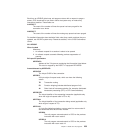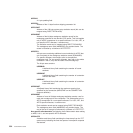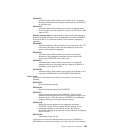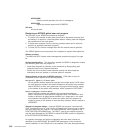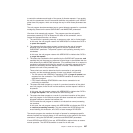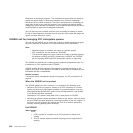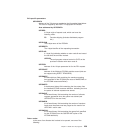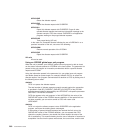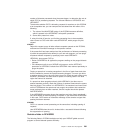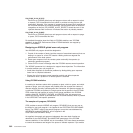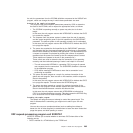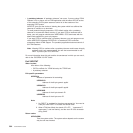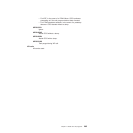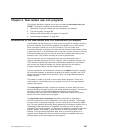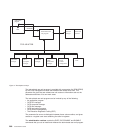number of allocates processed since the queue began, to determine the rate at
which CICS is processing requests. The relevant fields are: UEPSAQTS and
UEPSACNT.
To determine whether CICS is allocating requests for sessions on this IPCONN
at an acceptable rate, you can compare the calculated time with either of the
following:
1. The value of the MAXQTIME option of the IPCONN resource definition,
which is passed in the UEPEMXQT exit-specific parameter.
2. Some other preset time value.
If, using this kind of formula, you find the processing time to be acceptable,
return control to CICS with return code UERCAPUR, which purges only this
request.
UERCAKLL
Reject this request, purge all other allocate requests queued on this IPCONN,
and send an information message to the operator console.
If the queue limit has been reached and the performance of allocate processing
is below the acceptable limits defined in your user exit program, you can purge
all queued allocate requests by specifying return code UERCAKLL.
UERCAKLL also causes CICS to:
v Return SYSIDERR to all application programs waiting on the purged allocate
requests.
v On subsequent calls to your XISQUE exit program, set the UEPFLAG
parameter to UEPRC8 to indicate that UERCAKLL was returned previously to
purge the queue.
Purging a queue that is causing congestion in the flow of tasks frees task slots
that are needed to prevent the system becoming clogged. The more you allow
a session queue to grow, the more likely you are to reach the task ceiling set by
the MAXT parameter, and then cause a queue of incoming tasks in the local
region that cannot be attached.
If a queue has been purged previously (with UERCAKLL) but there are no
queued requests currently, check the number of sessions freed since the queue
was last purged. This number is in UEPSARC8. If no sessions have been freed
on this IPCONNsince the queue was last purged, the problem that caused the
purge previously has not been resolved, and this request should be rejected
with UERCAPUR.
If the UEPSARC8 parameter shows that sessions are being freed, you should
use UERCAQUE to resume queuing of requests. If you return with UERCAQUE
in this case, CICS issues an information message to the console to signal that
queuing has been resumed.
UERCNORM
CICS is to resume normal processing on the connection, including queuing of
requests.
Use UERCNORM when the exit is invoked after a successful allocate following
the suppression of queuing.
Statistics fields in DFHISRDS
The following fields in IPCONN statistics can help your XISQUE global user exit
program to control allocate queues efficiently:
Chapter 1. Global user exit programs 261



